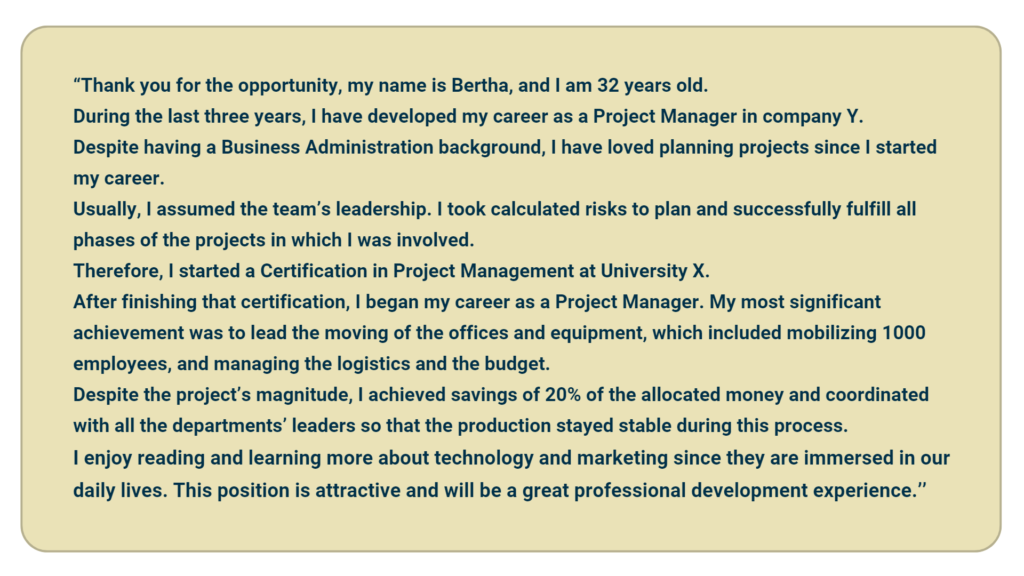What are we human beings made of? Maybe you lean towards Divine things, such as the soul, the physical, and the body, or perhaps you prefer more scientific explanations, and that’s fine. However, I can’t stop thinking about this quote from Uruguayan journalist Eduardo Galeano:
“Scientists say we’re made of atoms, but a little bird told me we’re made of stories.”
-Eduardo Galeano
You must think this article is taking on a poetic and unexpected air, but I promise you this has a goal. I want you to understand that your story has great power.

Your story can be different from any movie. You don’t have to be Tony Stark or Maverick in Top Gun. Your story is unique and, as simple as it is, has excellent power. The power to connect, excite, empathize and inspire.
Tell me about yourself…
This is the most challenging interview question because it can make the recruiter more interested in you… or not.
How to answer? Should I talk about my entire career? Will it be necessary to focus on my education? Is it time to talk about my challenges? How long should my response last? So many internal questions and scenarios I’m filtering through.
The recruiter is interested in knowing how suitable you are for the position. Still, we cannot ignore that we are also human beings. A strictly professional response can seem somewhat robotic, so the challenge is finding the perfect balance between personal and work stories.
How to tell your Career Story?
Storytelling is a mix between formulas, authenticity, and knowing your interviewer. That’s why it’s essential to:
- Know the company: Investigate what their values are. It is necessary to understand a little about their culture. It will help you better infer what type of candidate they are looking for.
- Meet the recruiter: Search who the company’s recruiters are and check their profiles and publications; because you need to “speak their language.”
- Please keep it simple: In this interview phase, you do not want to extend yourself; you need to keep the recruiter focused. Prepare to give an answer that is at most 2 minutes.
- Write your script, but don’t memorize it: It’s normal to be nervous, but you must convey confidence in your words.
- Don’t make a pitch. Keep a fluent conversation: No one wants to hire someone who is too salesy and only thinks about himself.
The Icing on the Cake
The structure of your professional history depends on its coherence and how you show yourself as the ideal candidate. For that, follows this formula:
Past – Present – Future.
- Past: Talk directly about studies and experiences related to the job you are applying for. Suppose the interview is for a Project Manager position. In that case, the interviewer is not interested in your experience selling slushies.
- Present: What are you doing right now? What are your achievements?
- Future: What is your vision? Why are you interested in this position? What makes you different?
Bonus Tip:
As in any story, you need to keep your balance. It is not about making it very personal, but not so cold that it refers strictly to the professional. Therefore, consider the following:
- Narrate your experience in a way that allows you to name your most outstanding skills.
- Try to include a story of overcoming, for example, if you have undergone a career change.
- Mention hobbies that demonstrate skills such as being organized, focused, intellectual, or any other that is related to the position.
Let’s look at an example:
Position: Project Manager in a Marketing Agency.
Interviewer: Talk to me about yourself…
Answer:

Now let’s recap:
A summary of how to tell the story of your career:
- Remember that your story is unique, deserves to be told, and has a lot of value.
- Know who you will be talking to.
- Keep the Past – Present – Future structure.
- Give a response, at most, 2 minutes long.
- Include a challenge you’ve had, along with skills relevant to the position.
- Talk a little about your hobbies.
And most importantly: be yourself, enjoy telling your story, smile when speaking and let your interviewer know how great you are.
You got this!
Related Articles: